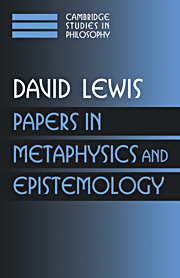Book contents
- Frontmatter
- Contents
- Introduction
- 1 New work for a theory of universals
- 2 Putnam's paradox
- 3 Against structural universals
- 4 A Comment on Armstrong and Forrest
- 5 Extrinsic properties
- 6 Defining ‘intrinsic’ (with Rae Langton)
- 7 Finkish dispositions
- 8 Noneism or allism?
- 9 Many, but almost one
- 10 Casati and Varzi on holes (with Stephanie Lewis)
- 11 Rearrangement of particles: Reply to Lowe
- 12 Armstrong on combinatorial possibility
- 13 A world of truthmakers?
- 14 Maudlin and modal mystery
- 15 Humean Supervenience debugged
- 16 Psychophysical and theoretical identifications
- 17 What experience teaches
- 18 Reduction of mind
- 19 Should a materialist believe in qualia?
- 20 Naming the colours
- 21 Percepts and color mosaics in visual experience
- 22 Individuation by acquaintance and by stipulation
- 23 Why conditionalize?
- 24 What puzzling Pierre does not believe
- 25 Elusive knowledge
- Index
23 - Why conditionalize?
Published online by Cambridge University Press: 08 February 2010
- Frontmatter
- Contents
- Introduction
- 1 New work for a theory of universals
- 2 Putnam's paradox
- 3 Against structural universals
- 4 A Comment on Armstrong and Forrest
- 5 Extrinsic properties
- 6 Defining ‘intrinsic’ (with Rae Langton)
- 7 Finkish dispositions
- 8 Noneism or allism?
- 9 Many, but almost one
- 10 Casati and Varzi on holes (with Stephanie Lewis)
- 11 Rearrangement of particles: Reply to Lowe
- 12 Armstrong on combinatorial possibility
- 13 A world of truthmakers?
- 14 Maudlin and modal mystery
- 15 Humean Supervenience debugged
- 16 Psychophysical and theoretical identifications
- 17 What experience teaches
- 18 Reduction of mind
- 19 Should a materialist believe in qualia?
- 20 Naming the colours
- 21 Percepts and color mosaics in visual experience
- 22 Individuation by acquaintance and by stipulation
- 23 Why conditionalize?
- 24 What puzzling Pierre does not believe
- 25 Elusive knowledge
- Index
Summary
INTRODUCTION (1997)
This paper presents what is nowadays called the ‘diachronic Dutch book argument’. I wrote it in 1972 as a handout for a course, with no thought of publication. I thought then that the argument was wellknown. Yet I could not find it presented in print, so I had to reconstruct it for myself. I showed my handout to Paul Teller; he presented the argument, with my permission and with full acknowledgement, in his article ‘Conditionalization and Observation’. Teller's article has become the standard source for the argument. But it seems to leave a question in some readers' minds: why does the argument call for conditionalizing on the subject's total increment of experiential evidence, no more and no less? Since my handout had addressed just that question, I decided there was some reason to publish it after all. Apart from a little editing to simplify notation, it appears here in its original form.
The diachronic Dutch book argument can be broken into two halves. Consider a conditional bet: that is, a bet that will be null and void unless its condition is met. We note, first, that the conditional bet is equivalent in its outcome, come what may, to a certain pair of unconditional bets. We note, second, that the conditional bet is also equivalent in its outcome, come what may, to a certain contingency plan whereby one's future betting transactions are made to depend on the arrival of new evidence. The first equivalence yields a well-known synchronic argument relating the prices of conditional and unconditional bets.
Information
- Type
- Chapter
- Information
- Papers in Metaphysics and Epistemology , pp. 403 - 407Publisher: Cambridge University PressPrint publication year: 1999
Accessibility standard: Unknown
Why this information is here
This section outlines the accessibility features of this content - including support for screen readers, full keyboard navigation and high-contrast display options. This may not be relevant for you.Accessibility Information
- 40
- Cited by
